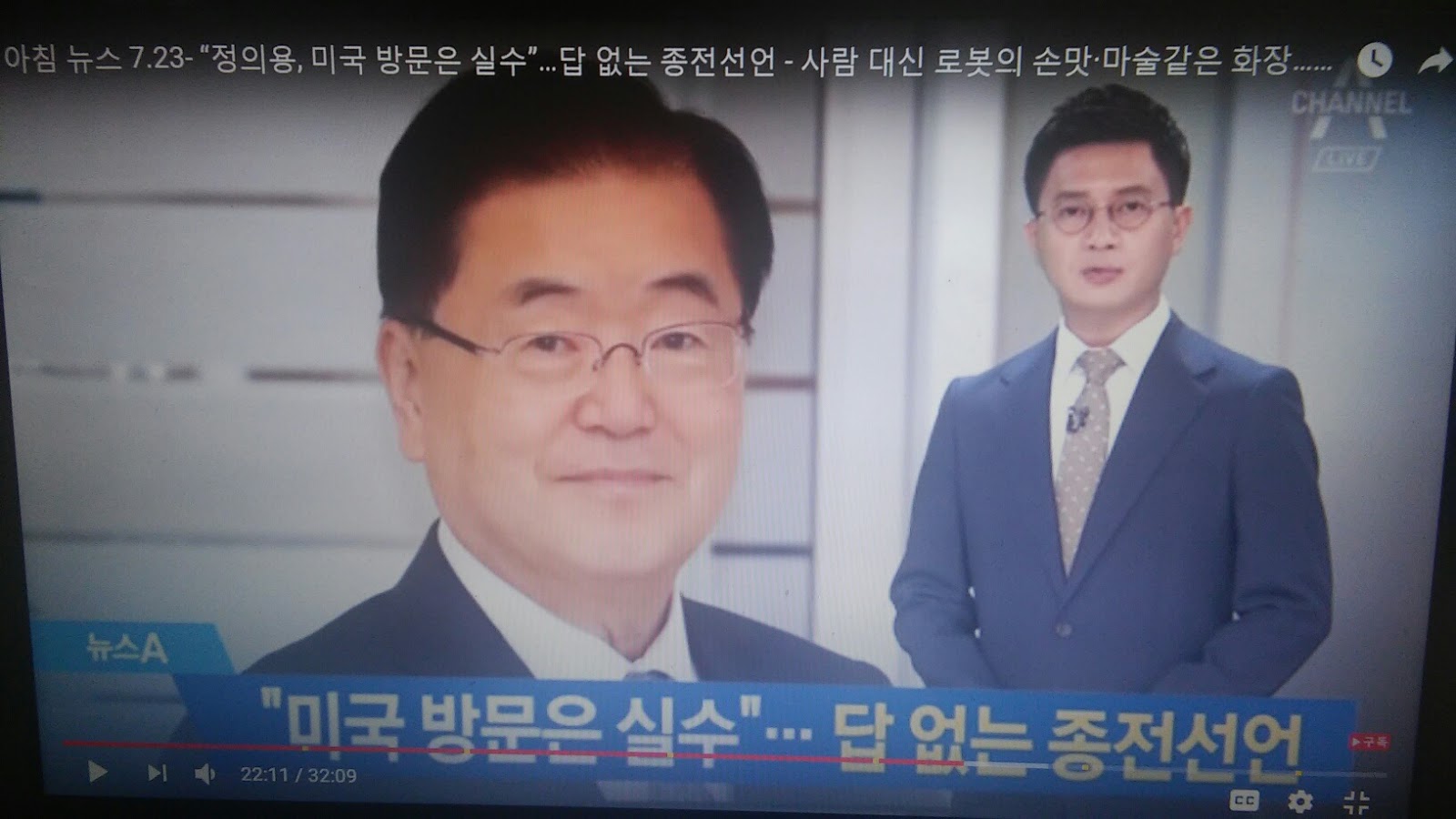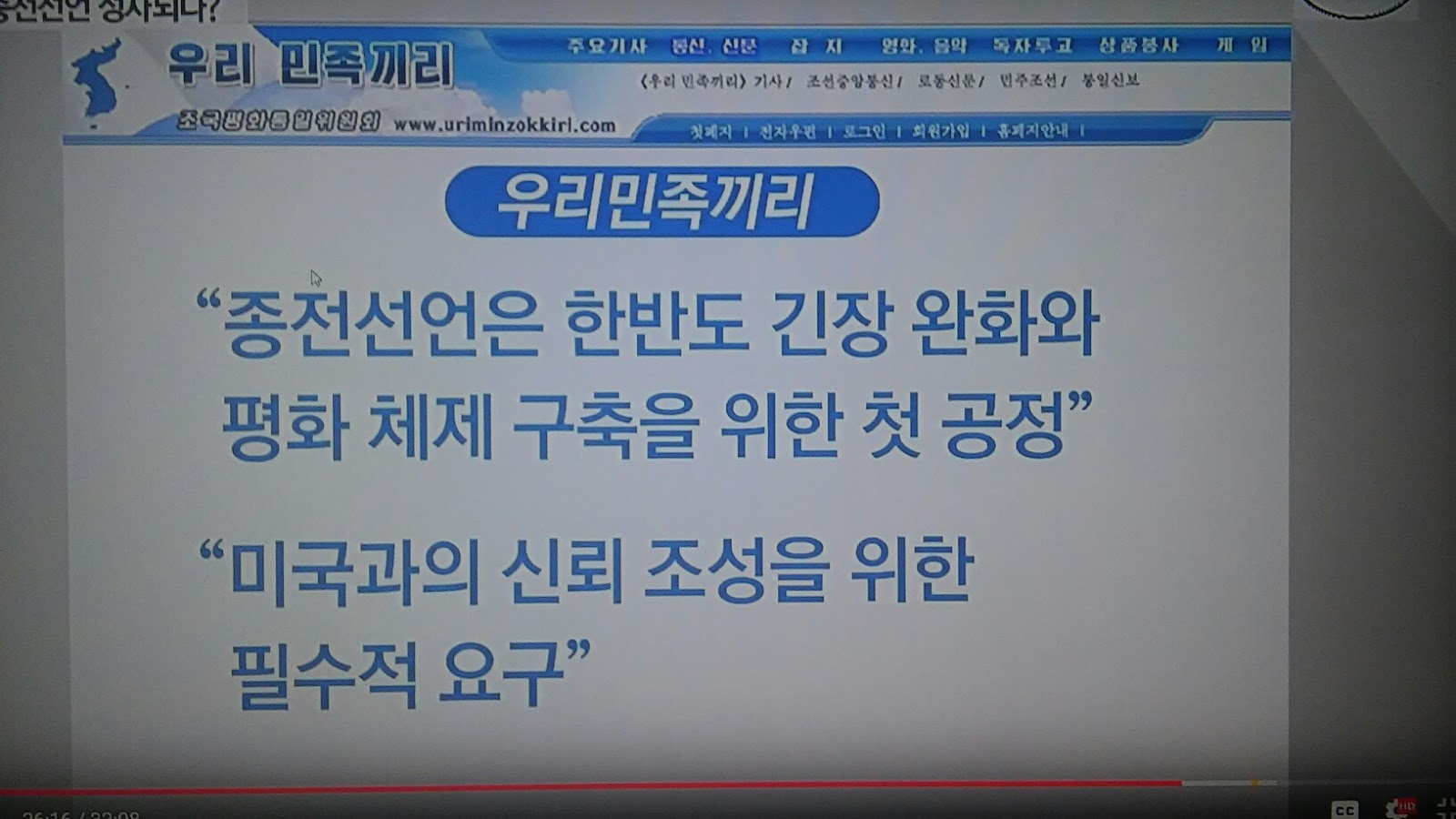soryang
soryang's JournalTrump undercuts his ROK conservative supporters with imperial remark
South Korea says no change on North Korean sanctions
Joyce Lee, Hyonhee Shin
Kang’s remarks on sanctions, retracted after criticism from South Korean lawmakers, prompted U.S. President Donald Trump to say South Korea would need U.S. approval to relieve sanctions.
“They won’t do it without our approval. They do nothing without our approval,” Trump told reporters, when asked about her comments.
Trump has said sanctions will remain in place until North Korea it denuclearizes.
Kang backtracked on her remarks after facing criticism from some conservative lawmakers that the sanctions cannot be removed unless North Korea first apologized for the attack, a stance adopted by former South Korean governments.
https://www.reuters.com/article/us-usa-northkorea-southkorea-sanctions/south-korea-says-no-change-on-north-korean-sanctions-idUSKCN1ML06L
It's obvious that South Korea is trying to get ready for a time in the future when sanctions are eased in some respect. ROK Foreign Minister Kang Kyung Hwa mentioning this outright was to blunder into the radical minority conservative party's trap, of making any reconciliation with the north dependent on approval from the surviving families of the Chonan incident. This would furnish an additional delaying tactic after any easing of international sanctions to the minority party which adamantly opposes the current democratic party administration on all fronts. Ironically, Trump's dumb remarks discredited and undermined his conservative South Korean supporters by painting them as tools of an outside great power that seeks to dominate South Korea's internal political policies. The minority conservative parties, whose corrupt former presidents are in prison, suffered additional political losses during the last off year election. They have been desperately seeking to get some traction against the Moon administration.
Trump's remarks fall right into the North Korean ideological criticism of the South as a "lackey of the imperialist US," and diminish South Korea's posture both with the North and internationally. Korean conservatives, especially in the Liberty Korea Party, continue to play the role of spoiler for the US and Japan in South Korean internal politics.
However, some Korean conservative lawmakers are trying to distance themselves from Trump's remarks calling them "insulting."
South Korean National Security Advisor's Visit to DC: A Mistake?

Chung Eui Yong avoided questions about the results of his most recent trip to Washington, D.C., to meet with National Security Advisor John Bolton, other than to say their talks had been productive. Specifically, he refused to answer the question about whether he had discussed a declaration to end the Korean War at the meeting. An anonymous South Korean foreign office news source said that Chung's trip to Washington was a mistake. According to this source, he was told, "Don't persuade us, persuade North Korea first," which sounds a lot like a rebuke. This raises Moon's recent comment at the Singapore ASEAN conference concerning the stalemate, of "which comes first, the chicken or the egg?" This the South Korean president's reference to the timing of denuclearizaton measures desired by the US and UN, and establishment of a "peace regime," on the Korean peninsula, desired by the North Koreans, including a declaration that the Korean war is over. As the reporter at the airport persisted in his question about the declaration of the end of the Korean war issue, Chung just made a wry smile, and said goodbye.
As the US returned to a hard line in the negotiations with North Korea, South Korean Kang Kyung Hwa met with Pompeo at the UN, to make a "no daylight" presentation on stiffening the sanctions regime on North Korea. Her normally serious demeanor was replaced by an ebullient touchy feely posing with Secretary Pompeo which seemed oddly inappropriate under the circumstances. Sources in the White House had made suggestions that South Korea somehow shared responsibility for sanctions violations involving importation of coal from two foreign registry ships from Panama and Sierra Leone, respectively, that were allegedly transhipped from Russia, disguising the identity of the North Korean bulk shipment. The issue was why didn't the South Koreans investigate the brokers and seize the shipments?
Apparently, Kang got some concessions from the US regarding pending issues agreed to between North and South Korea at Panmunjeom. One exception to the sanctions being the exception for the shipment of military communications materials and vehicles to North Korea for communications between North Korean and South Korean military commands aimed at avoiding provocations or incidents that could jeopardize security. The second exemption involves resources necessary to support a civil liason office at the Kaeseong Industrial zone in North Korea. The third exemption requested was for materials, equipment and other resources necessary to renovate the Kumgangsan Resort facility to be used for the separate families reunion schedule for August 20. This latter event is currently on hold on the North Korean side, who have been critical of Moon's ASEAN speech for merely "chanting in unison" with his "American master" and flippantly advising Kim what to do to avoid a "serious judgement from international society."
It is unlikely that National Security Advisor Chung's trip to meet Bolton was a mistake, but it may have been futile. The discussion about what the North Korean dissatisfaction is really all about has been covered in South Korean media and couldn't be clearer to anyone who follows North Korean official media. It's definitely not something to which the hardliners in the administration are receptive, as they line up to conform to the avalanche of criticism in the US media after the summit and the suspension of joint military exercises.
Before the summit when Trump and Pompeo met with Kim Yong Chol, the Vice Chairman of State Affairs in North Korea, they told him they would consider an announcement ending the Korean War. In fact, Pompeo had already announced publicly that there would be no CVID, (complete verifiable irreversible denuclearization) without guarantees of North Korean security, CVIG, complete verifiable irreversible guarantee of (North Korean) security.
 .
.
Shortly after the summit in Singapore, they again demonstrated that they understood North Korean concerns about security and the notion of reciprocity and trust building by suspending joint military exercises with South Korea.
After the wave of criticism here in the US from the usual interested parties and opposition, Pompeo and Trump retreated for political cover to the "one sided, ganster like demand," for nuclear disarmament by the North. When Pompeo got to Pyongyang for post summit negotiations, he refused to consider North Korean requests oriented toward normalizing diplomatic relations and ending the war. That put everything on hold. It is likely it was known this would happen before Pompeo arrived in Pyongyang.
It's possible that the serviceman's remains repatriation issue is still on track. S.Korean news reports on the 21st suggested that the talks had been successful. The date set for repatriation is July 27, the 65th Anniversary of the Armistice.
Here's another indication that the North Korean's aren't giving up on what the US promised at the summit in Singapore.

"A declaration of the end of the war to relieve tension on the Korean peninsula, and to construct a peace regime, is the first process. In order to build trust with the United States, this is an indispensable demand." (Our People North Korean web site)
Perhaps the White House wants to forget the joint statement President Trump signed in Singapore with Kim Jong Un.
CIA Assessment Sways Trump?
South Korea's A Channel Top Ten program is reporting based upon an Asahi Shin Moon (Japanese newspaper) story, that Trump's decision to meet Kim, was based upon a CIA assessment that he was attracted to western culture, affected by his education in Switzerland, and would be easier to deal with than previous North Korean leaders in negotiations. Wow, what a brilliant observation! Dennis Rodman figured this out a few years back. What was the giveaway? The empty beach and ski resorts or the fact that he loves basketball?
On the other hand, the powerful attraction of westerners for eastern culture is also playing a role. South Korea has played an enormous role in this development over decades propagating their Korean culture internationally. The active efforts of President Moon's administration to capitalize on South Korean media sophistication in its messaging to both the North and the US have used this experience to drive recent diplomacy.
The idea that the CIA unlocked this possibility is an overstatement, but I'll give the devil due credit for a certain level of intelligence if he saw the opportunity while listening to his CIA experts, and grabbed it.
It's the Lawrence of Arabia hubris lurking in the heart of westerners that is being seduced as well. So now we are treated daily to the spectacle of endless politicians and pundits purporting ludicrously to be experts on negotiating with the far east.
Will Bibimbap Be Served in Singapore?
The fundamental misrepresentation from pundits and a large number of "experts," is that North Korea isn't going to denuclearize. Further, that Trump is "being played," and other critiques. Lately, the recent North Korean statements reflecting that attitude, are stated in the conditional, "if the US doesn't ..." The joint statement coming out of the Moon Kim summit at Panmunjeom clearly stated that denuclearization of the Korean peninsula was their policy objective. Of course, the cynical rejoinder is "well we've heard that before, if their lips are moving, they're lying..."
To his credit, even Pompeo gets that the real stumbling block is coming up with US guarantees of North Korean security, normalization of relations, replacing the armistice with a peace agreement, and how to stage these reciprocal moves, in addition to relaxation of sanctions. Pompeo calls it CVIS, complete, verifiable, irreversible, security for North Korea. Without CVIS you won't get CVID.
While there is a notion of bringing out ICBMs, or warheads, in a "bundle" in a relatively short period of time, a framework, (if you'll excuse the term) is going to have to be adopted which presents a structure for negotiations and the execution of any agreement reached, in terms of subject matter, scope and process. It will involve steps, definitions of the scope and timing of those steps, and how US reciprocal concessions will need to be integrated with those steps. The problems here are both political and practical. Various experts with experience have stated that a truly full blown "irreversible denuclearization" of unlimited scope could take "ten years" Some of this has the sound of advertising copy. One expert has said, in the existential sense, there is no such thing as irreversible denuclearization as long as there are scientists who know how to do it. The political side of the problem is that any phased structure with reciprocity will arguably appear similar in design to other agreements that both Trump and neocons have criticized. When making bibimbap, whatever the ingredients, and whoever the chef, it still looks like bibimbap when it's done.
Profile Information
Member since: Sat Mar 14, 2009, 09:45 PMNumber of posts: 3,299